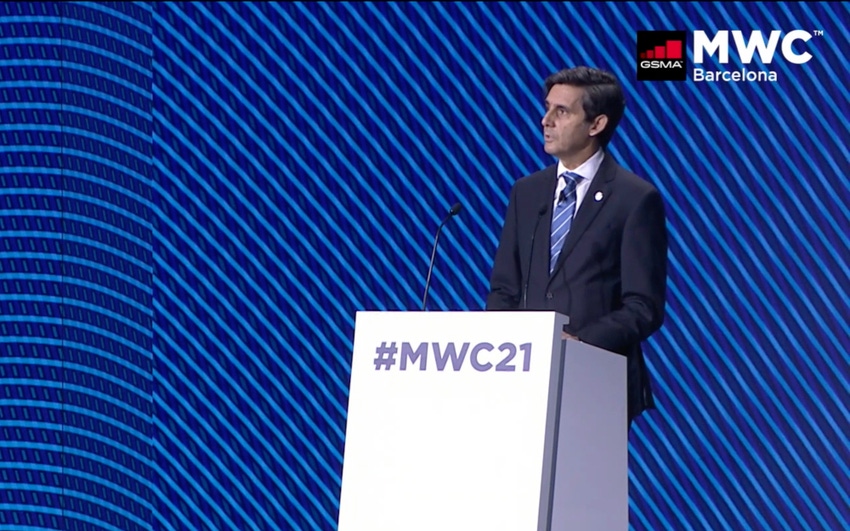It wouldn't be Mobile World Congress if the opening keynote session did not feature at least one high-profile telecoms executive seeking to reshape the regulatory landscape.
June 28, 2021

It wouldn’t be Mobile World Congress if the opening keynote session did not feature at least one high-profile telecoms executive seeking to reshape the regulatory landscape.
This year it was the turn of Telefonica’s top dog José María Álvarez-Pallete (pictured), Chairman of the Spanish incumbent, delivered an address in which he highlighted artificial intelligence (AI) as one of the major end games of the digital transformation, but also warned that Europe faces a big challenge in seizing the digital opportunity and as such called for regulatory change.
Essentially, the industry needs cutting-edge connectivity on which to run technologies like edge computing, cloud, cybersecurity, IoT and big data, he explained in Barcelona on Monday morning. Finally, there will be a significant hike in data as a result of digitalisation – Álvarez-Pallete noted that already “as much as a 40% of Internet traffic is non-human, generated by machines that are talking to each other” – and this can be transformed into information through AI. “The real evolution lies there,” he said.
But… and there’s always a but…
“Governments need to attract investment in the smart digital infrastructure that will make all that possible,” Álvarez-Pallete said, warning that the industry faces some time pressure. “To grab [the opportunity], Europe needs a sustainable telco sector, otherwise we will lag further behind in the global race for digital leadership,” he cautioned.
It’s a warning that has echoed through the auditorium of the Barcelona Fira Gran Via on numerous occasions over the years, but it is no less relevant now than it has ever been.
“We demand a new regulatory framework and competition rules to build a strong digital Europe,” Álvarez-Pallete said, adding the usual comments around the need for such a move to enable digitalisation to drive growth, job creation, sustainability and inclusion.
Whether the regulators are listening remains to be seen. But early indications from this year’s Congress suggest people will pay attention when the subject of AI comes up; it is shaping up to be one of the key topics of the event.
One of Orange’s demonstrations at the event centres on automation, AI and cloud as key enablers to reinvent network operations for increased efficiency and quality of service. “Operational efficiency and smarter networks are key objectives for Orange. To help reach those objectives, we must shift from a management paradigm centred on managing siloed network technologies to network operations centred and driven by the data produced by these networks,” the telco said, in a statement.
On the vendor side IBM presented new AI-powered automation software – IBM Cloud Pak for Network Automation – which runs on Red Hat OpenShift. In its own words, the new product will “help organisations simplify the broad adoption of 5G and deliver services in minutes, rather than days.”
Those are just two examples; there will almost certainly be many more over the coming few days. In the meantime, it’s back to Telefonica for the final word.
The Covid-19 pandemic of the past year “has been like travelling in a time machine five years ahead in terms of adoption of technology,” said Álvarez-Pallete. If that’s the case, the coming years are shaping up to be pretty exciting, from a tech point of view, at least.
About the Author(s)
You May Also Like








.png?width=300&auto=webp&quality=80&disable=upscale)


_1.jpg?width=300&auto=webp&quality=80&disable=upscale)


.png?width=800&auto=webp&quality=80&disable=upscale)